 |
Thursday
08 February 2001
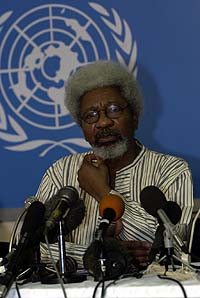 |
|
Nobel
Prize Laureate Wole Soyinka meets the press and public at
a news conference this afternoon.
|
Delegates
convened in Plenary for the high-level segment of the meeting, which included
a round-table ministerial dialogue on implementation and development of
the Nairobi and Malmö Declarations, and a consultation on poverty and
environment. Two break-out groups - on poverty and pollution and on poverty
and health - were also held. The Committee of the Whole (COW) convened
in afternoon and evening sessions to continue considering draft decisions.
The drafting group and the working group on budget and administrative
matters also met, and a number of informal contact groups were convened.
For
streaming video of negotiations, press conferences, and side events,
visit the UNEP GC website at
http://www1.unep.org/video/
|
|
| |
|
| |
Opening
Ceremony :
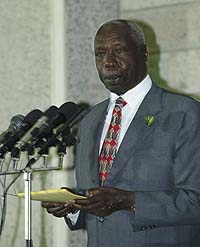 |
| President
Moi, Kenya, adresses the plenary during this morning's high level
segment. |
In
his introductory remarks, Governing Council President Anderson reminded
delegates of the importance of the Ministerial Forum to the 2002 World Summit
for Sustainable Development. Nitin Desai, UN Under Secretary-General of
Economic and Social Affairs, hoped the Session would guide and shape the
Summit's outputs. South Africa's Minister of Environment and Tourism, Mohammed
Valli Moosa, noted the interlinkages between poverty, environment and development.
Regarding preparations for the 2002 World Summit for Sustainable Development,
he underscored the need for public mobilization and proposed seven elements
to guide discussions on governance and institutional arrangements, inter
alia: defining workable institutional arrangements; addressing finances,
including looking into the decision-making of international financial institutions;
and instituting a system that empowers small and developing countries to
participate meaningfully. This discussion should be conducted at Ministerial
level, as the issues are political. Two children said they were making two
sculptures: a tree symbolizing the tree of life; and a bridge, symbolizing
dialogue among civilizations, and bridges between the rich and poor and
the young and old. UNEP/ONON/UNHCS staff President Mary Odhiambo, paid special
tribute to UNEP Executive Director Klaus Töpfer on efforts to promote open
staff dialogue. Tokiko Kato, UNEP Envoy of Japan, stressed concern over
a changing global environment and performed two songs. UNEP Executive Director,
Klaus Topfer stressed the need for a successful World Summit on Sustainable
Development resulting in concrete decisions and actions. He urged for financial
backing to assist UNEP fulfill its commitment to the Summit. Kenyan President
Daniel Moi highlighted UNEP's financial constraints, and, stressing mobilization
of traditional and nontraditional resources, urged the private sector to
make contributions. |
|
|
SIDE
EVENTS:
Special
Reading by World Renowned Nigerian Writer & Nobel Prize Laureate
Nigerian writer and Nobel Prize Laureate Wole Soyinka gave a special
reading of a poem written especially for this occassion, in the memory
of the 1998 bomb blast victims of Kenya and Tanzania.
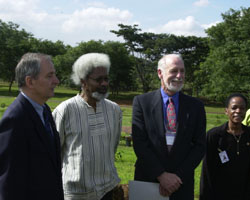 |
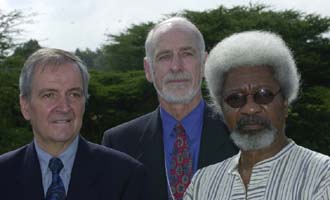 |
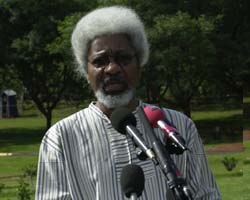 |
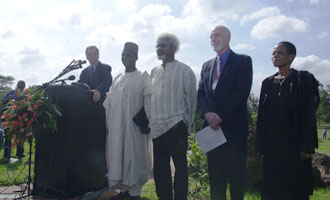 |
| Wole
Soyinka,
reads a poem for the occassion, joined by UNEP Executive Director
Klaus Topfer, GC President David Andersen, and Habitat
Executive Director Anna Tibaijuka. |
|
| |
Launching
UNEP.net
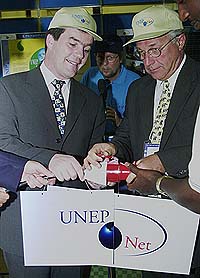 |
|
Noel Dempsey (Ireland) plugs in the new UNEP.net website,
while Tim Foresman looks on from behind. |
Tim
Foresman, Director, UNEP Division of Early Warning and Assessment
(DEWA) presented the launch of the UNEP.net
website. The new online application serves up a network portal offering
a forum for scientific, technical peer review; provision of insights on
environmental issues to the global communityl and exchange of ideas, information
and data. It also contains a user-driven map-generating facility and compiles
information culled from databases of partnering organizations.
Developed
with industry, academic, government and NGO partners, UNEP.net
is an internet-based environmental information network that brings together
new integrated information frameworks and harmonized, readily accessible
data sets, including UNEP's own assessment activities.
|
| |
|
| |
|
| |
Relevant
Information:
Past
IISD Coverage:
|
| |
|
| |
|
| |
|









